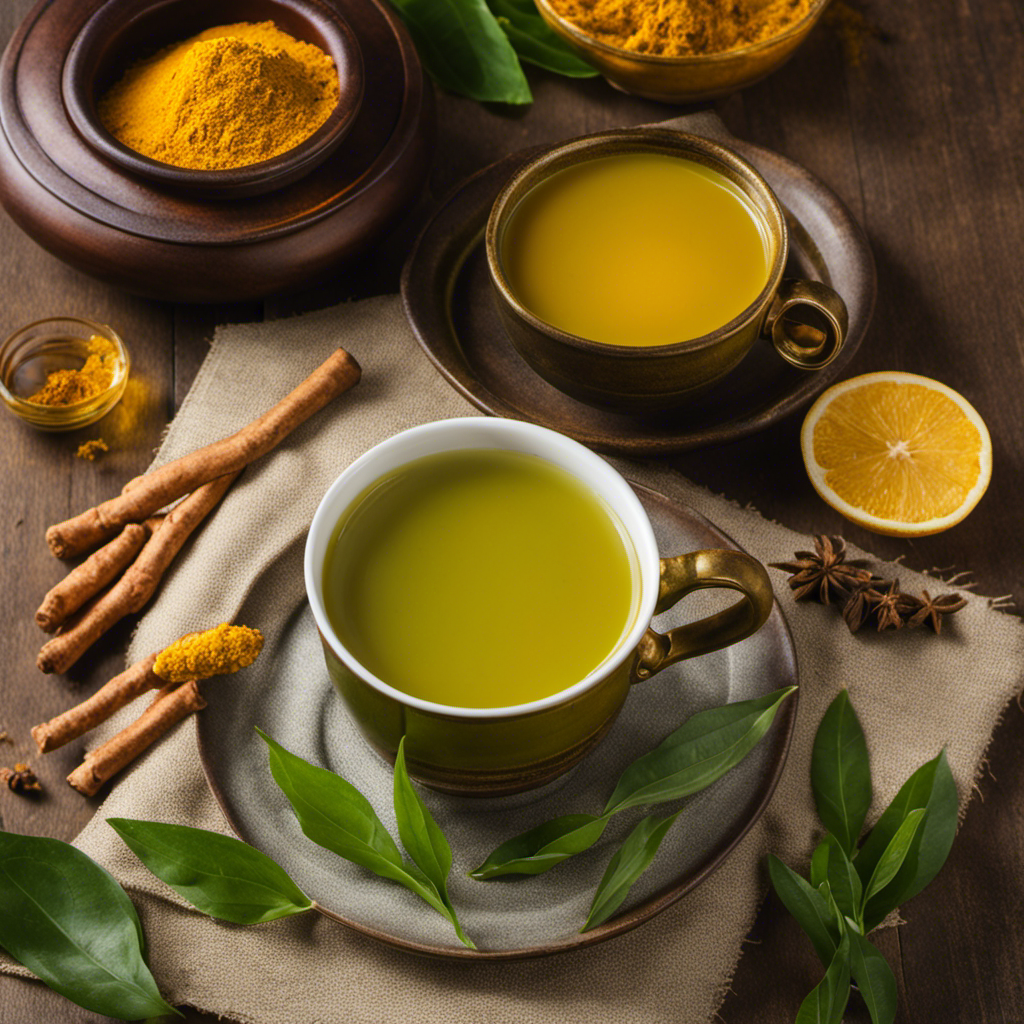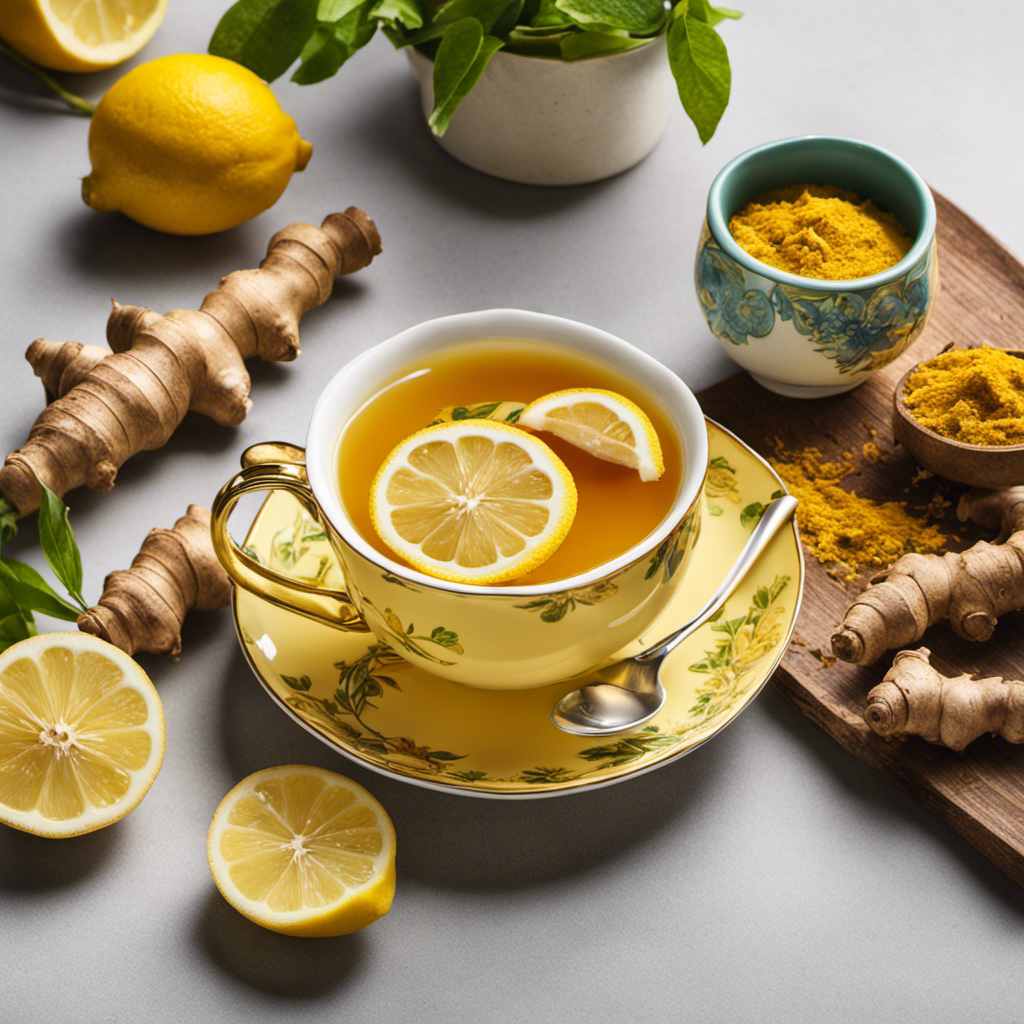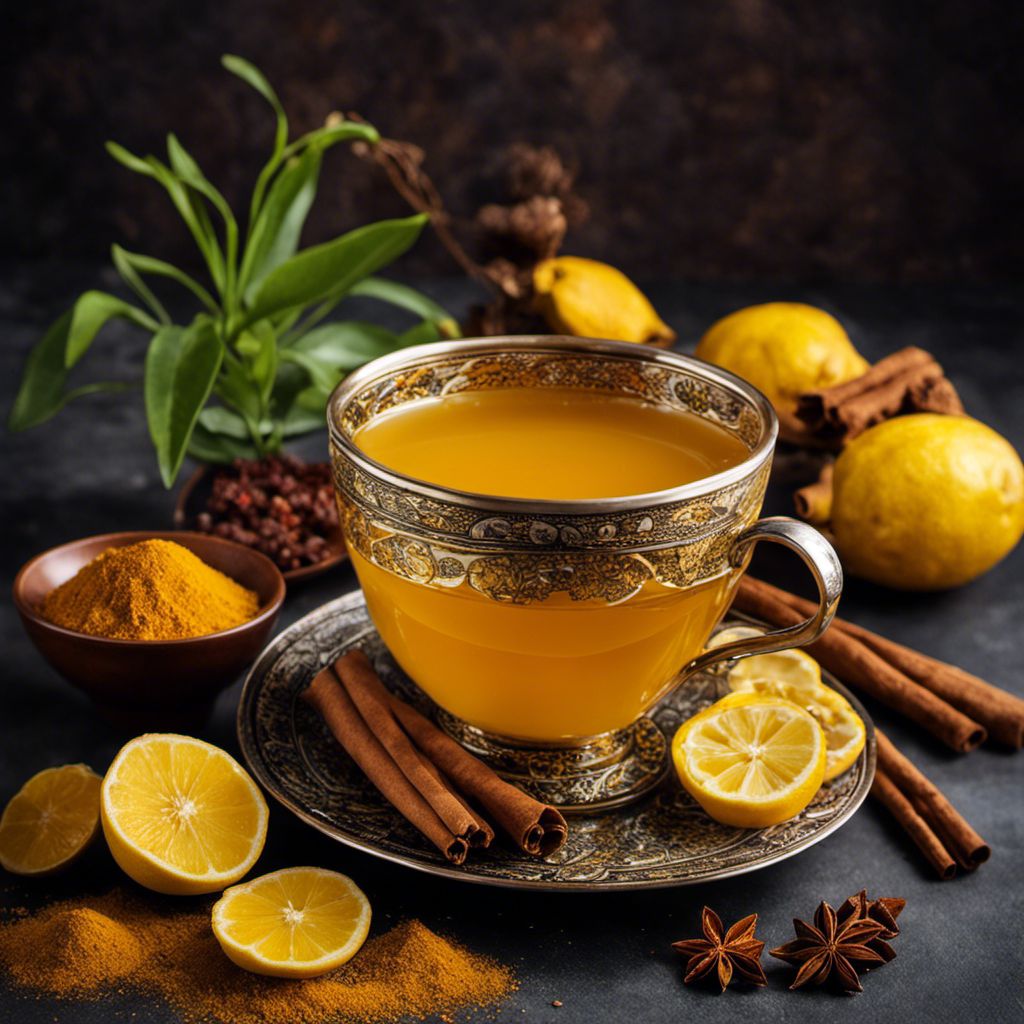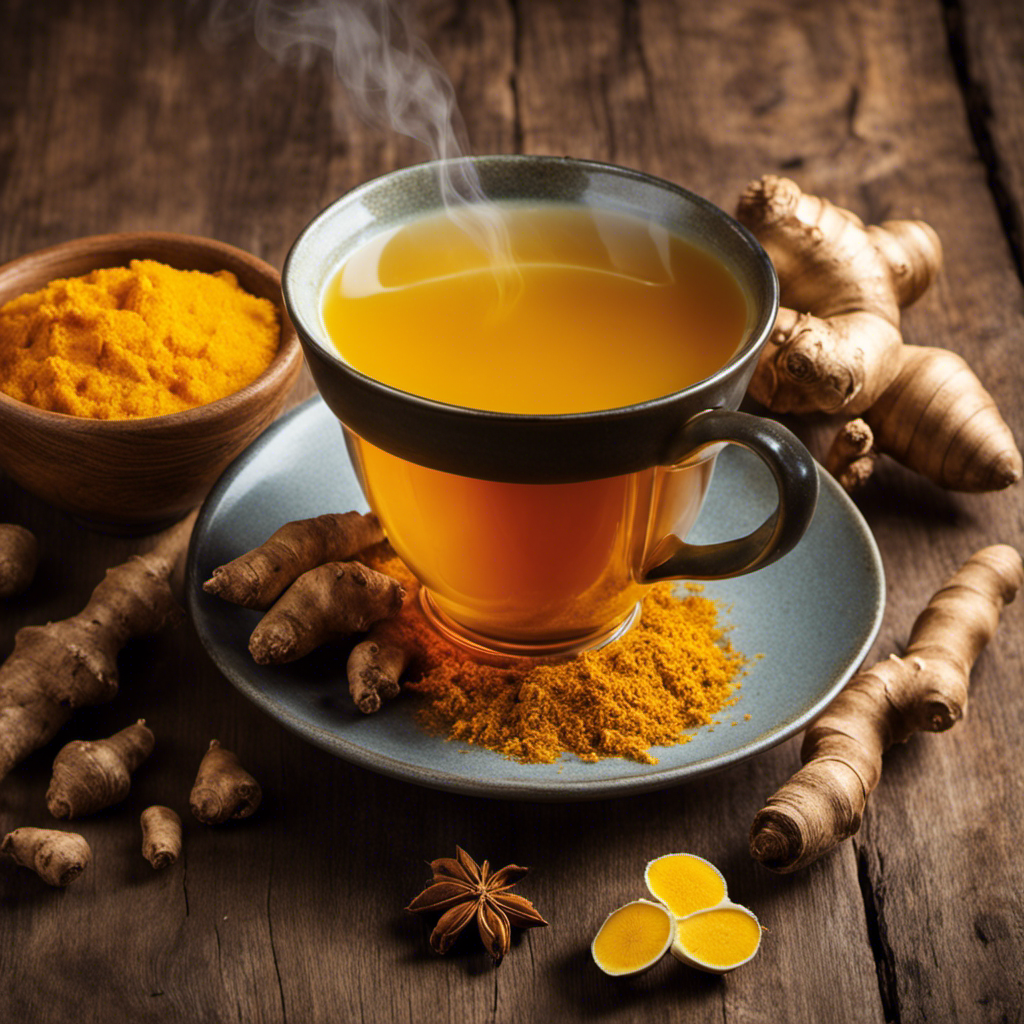Turmeric Tea
Does Turmeric Tea Stain Your Teeth Yellow

Picture this: a warm, comforting cup of turmeric tea in your hands, soothing your senses and providing a multitude of health benefits. But as you take a sip, a nagging thought lingers in your mind: will this vibrant yellow elixir leave behind an unwelcome stain on my teeth?
It’s a valid concern, as we all want to maintain a bright, confident smile. In this article, we will explore the truth behind whether turmeric tea stains your teeth yellow.
To answer this question, we must delve into the composition of turmeric tea and its potential staining properties. We will also compare it to other staining beverages and assess its impact on enamel health.
Additionally, we will provide tips on preventing stains from turmeric tea and discuss whether brushing alone is enough to remove them. Furthermore, we will explore professional teeth whitening options and natural remedies for teeth whitening.
Finally, we will address the myth or fact surrounding turmeric tea as a teeth whitening method. So, let’s embark on this journey together and uncover the truth about turmeric tea and its effect on the brightness of our smiles.
Key Takeaways
- Turmeric tea stains teeth less than coffee and red wine due to its lower concentration of staining compounds.
- Using a straw when drinking turmeric tea can minimize contact with teeth and reduce staining.
- Turmeric capsules or supplements can be alternatives to turmeric tea to avoid stains.
- Professional teeth whitening options can effectively remove stains caused by turmeric tea.
Understanding the Composition of Turmeric Tea
Do you ever wonder what makes turmeric tea so vibrant and potentially staining for your teeth? Turmeric tea derives its distinctive bright yellow color from the compound called curcumin, which is found in the turmeric root. Curcumin is known for its antioxidant and anti-inflammatory properties, making turmeric tea a popular choice for promoting overall health.
However, it’s important to be aware of potential side effects. One such side effect is the potential staining of teeth. The intense yellow pigments in turmeric can adhere to the enamel, leading to yellow discoloration over time. This staining effect can be exacerbated by factors such as poor oral hygiene or consumption of highly pigmented foods and beverages.
In the next section, we’ll further examine the staining properties of turmeric and discuss ways to minimize its impact on teeth health.
Examining the Staining Properties of Turmeric
When you enjoy a soothing cup of turmeric-infused brew, you might notice an intriguing change in the color of your pearly whites. Turmeric, known for its vibrant yellow pigment, has the potential to stain teeth due to its natural dye properties. However, the staining effect of turmeric tea on teeth varies depending on several factors, such as the concentration of turmeric used, the duration of exposure, and individual oral hygiene habits. To understand the staining properties of turmeric better, let’s take a look at the following table:
| Factors Affecting Staining | Effect on Teeth |
|---|---|
| Concentration of Turmeric | Higher concentration increases the likelihood of staining |
| Duration of Exposure | Longer exposure time can intensify the staining effect |
| Individual Oral Hygiene | Proper oral hygiene practices can help prevent or minimize staining |
Despite its potential to stain teeth, it’s important to note that turmeric tea also offers various benefits, such as its anti-inflammatory and antioxidant properties. To enjoy the positive effects while minimizing staining, maintaining good oral hygiene and regular dental check-ups are essential. Now, let’s delve into comparing turmeric tea to other staining beverages.
Comparing Turmeric Tea to Other Staining Beverages
If you indulge in beverages like coffee or red wine, you may notice a striking difference in the appearance of your teeth compared to when you enjoy turmeric-infused brew. Here is a comparison between turmeric tea and other staining beverages:
- Turmeric tea vs coffee: which stains teeth more?
- Turmeric tea contains natural pigments called curcuminoids, which can potentially stain teeth. However, coffee contains more intense staining compounds like tannins and polyphenols, making it more likely to cause discoloration.
- How to remove turmeric stains from teeth:
- Good oral hygiene practices like brushing and flossing can help prevent and remove stains. Additionally, using whitening toothpaste or seeking professional dental cleaning can reduce the appearance of turmeric stains.
Turmeric tea’s impact on enamel health will be discussed in the subsequent section.
Impact of Turmeric Tea on Enamel Health
Protect your pearly whites and savor the benefits of turmeric tea without worrying about its impact on the strength of your enamel. Research suggests that while turmeric tea may stain your teeth temporarily, it does not cause enamel erosion or long-term damage. To understand this further, let’s take a closer look at the impact of turmeric tea on enamel health.
Enamel, the outermost layer of our teeth, is the hardest substance in our bodies. It protects our teeth from decay and damage. A study comparing the effects of turmeric tea to other staining beverages on enamel found that turmeric tea had the least impact on enamel erosion. In fact, it was even less erosive than coffee and black tea.
So, enjoy your cup of turmeric tea knowing that it is unlikely to cause any significant harm to your enamel. In the next section, we will explore some tips for preventing stains from turmeric tea.
Tips for Preventing Stains from Turmeric Tea
To keep your smile bright while enjoying the benefits of turmeric tea, try these simple tips for preventing any potential discoloration. First, consider using a straw when drinking turmeric tea. By sipping through a straw, you can minimize contact between the tea and your teeth, reducing the chances of staining.
Another option is to drink your turmeric tea at a cooler temperature. Hot liquids can increase the likelihood of stains, so letting your tea cool down a bit can help.
Additionally, you may want to alternate between turmeric tea and other beverages. By mixing things up, you can give your teeth a break from the staining effects of turmeric.
Finally, if you’re concerned about stains, you can explore turmeric tea alternatives such as turmeric capsules or supplements.
Transitioning into the subsequent section, let’s now discuss whether brushing alone is enough to remove turmeric stains.
Is Brushing Enough to Remove Turmeric Stains?
Brushing alone may not be enough to remove turmeric stains from your teeth. While brushing is important for oral hygiene, turmeric stains can be stubborn and require additional measures. Here are four alternative teeth whitening methods to consider:
- Oil pulling: Swishing coconut or sesame oil in your mouth for 10-15 minutes can help remove stains and promote oral health.
- Baking soda and hydrogen peroxide paste: Mixing these ingredients into a paste and gently brushing your teeth with it can lighten stains.
- Activated charcoal: Applying activated charcoal to your teeth and rinsing thoroughly can absorb stains and whiten your smile.
- Lemon juice and salt scrub: Mixing lemon juice and salt to create a scrub can exfoliate your teeth and reduce the appearance of stains.
While these alternative methods can be effective, professional teeth whitening options may provide more immediate and dramatic results.
Professional Teeth Whitening Options
One option for achieving a brighter smile is through the utilization of professional teeth whitening methods. These methods are effective in removing stains caused by turmeric tea and can significantly improve the whiteness of your teeth. There are various professional teeth whitening options available, including in-office treatments and take-home kits. In-office treatments are typically more expensive, ranging from $500 to $1,000, but they provide immediate results and are performed by dental professionals. Take-home kits, on the other hand, are more affordable, usually ranging from $100 to $400, but they may take longer to achieve desired results. It is important to consult with a dentist to discuss which option is best for you based on your budget and desired outcome. Transitioning into the subsequent section about natural remedies for teeth whitening, there are also alternative methods that can be explored.
Natural Remedies for Teeth Whitening
If you’re looking for a natural way to brighten your smile, you’ll be amazed to learn that certain fruits like strawberries can actually whiten teeth by breaking down surface stains. In fact, studies have shown that the malic acid found in strawberries can help remove discoloration and improve the overall whiteness of your teeth.
Using natural ingredients and home remedies for teeth whitening is a popular option for those who prefer a more holistic approach. Here are three effective options to consider:
- Baking Soda: This common household ingredient has mild abrasive properties that can gently scrub away stains on the surface of your teeth.
- Coconut Oil Pulling: Swishing coconut oil in your mouth for 10-15 minutes a day can help remove plaque and surface stains, leading to a brighter smile.
- Apple Cider Vinegar: Although it may seem counterintuitive to use an acidic substance, apple cider vinegar can help remove stubborn stains. However, be cautious as excessive use may erode tooth enamel.
These natural remedies offer a convenient and cost-effective way to achieve a whiter smile without the use of harsh chemicals. However, it’s important to separate fact from fiction when it comes to teeth whitening methods. Is turmeric tea really an effective option? Let’s find out in the next section.
Myth or Fact: Turmeric Tea as a Teeth Whitening Method
Indulge in a warm cup of golden goodness and discover whether turmeric tea lives up to its reputation as a natural teeth whitening remedy.
Turmeric tea is often hailed for its numerous health benefits, including its potential to whiten teeth. However, the effectiveness of turmeric tea as a teeth whitening method is still up for debate. While some believe that the active compound in turmeric, called curcumin, can help remove stains and brighten teeth, there’s limited scientific evidence to support this claim.
Additionally, turmeric tea has the potential to stain teeth due to its vibrant yellow color. To enjoy the benefits of turmeric tea without the risk of staining, it’s recommended to drink it in moderation and practice good oral hygiene.
If you’re still interested in trying turmeric tea for its potential teeth whitening benefits, there are various recipes available online to help you incorporate this spice into your daily routine.
Frequently Asked Questions
Can turmeric tea stain dental restorations, such as fillings or veneers?
Turmeric tea does not stain dental restorations like fillings or veneers. However, it may cause tooth sensitivity and affect gum health if consumed excessively due to its natural staining properties.
Does adding milk or other additives to turmeric tea reduce its staining properties?
Adding milk or other additives to turmeric tea can potentially reduce its staining properties on teeth. However, further research is needed to determine the exact effectiveness of these additives in preventing teeth staining caused by turmeric tea.
How long does it take for turmeric tea stains to appear on teeth?
Turmeric tea stains may appear on teeth within a few days of regular consumption. Factors like frequency of consumption, oral hygiene, and individual variations can influence the timeframe for stains to appear.
Can turmeric tea stains be removed by regular toothpaste?
Regular toothpaste may not effectively remove turmeric tea stains from teeth. However, proper dental hygiene practices like brushing and flossing can help minimize staining. Additionally, considering the numerous health benefits of turmeric tea, it is still worth incorporating into your routine.
Are there any long-term effects on tooth enamel from consuming turmeric tea?
Long-term consumption of turmeric tea may lead to increased tooth sensitivity, but it also offers potential benefits for oral health. Its anti-inflammatory properties can help combat gum disease and promote overall oral well-being.
Conclusion
After much research and consideration, it’s safe to say that turmeric tea does indeed stain your teeth yellow.
Despite its numerous health benefits, this golden elixir has a notorious reputation for leaving behind unsightly stains on your pearly whites.
So, while you may enjoy sipping on turmeric tea for its anti-inflammatory properties, be prepared for the ironic consequence of a yellow smile.
Remember to take preventive measures and explore teeth whitening options if you want to combat the turmeric tea stains.
Arf, an author and an innovative enthusiast of coffee, coffee alternatives, and tea, plays a crucial role as a contributor to the esteemed Cappuccino Oracle platform. Renowned for his curiosity and passion for these captivating beverages, Arf has carved out a unique space for himself in the world of exploration and writing. He realized that coffee, coffee alternatives, and tea are not mere drinks to keep one awake, but universes of flavors and stories waiting to be explored.
Arf’s articles for Cappuccino Oracle blend meticulous research with personal experiences, providing readers with an in-depth understanding of various types of coffee, coffee alternatives, and tea, along with their unique characteristics, cultures, and histories. His honest reviews and engaging narratives guide readers on their own journeys, helping them discover their preferences and find their perfect brew.
Turmeric Tea
Vitamins in Turmeric Tea

I have always been intrigued by the effectiveness of natural remedies, and when I came across turmeric tea, I realized I had found something truly unique.
Little did I know, this golden elixir is not only packed with flavor but also loaded with essential vitamins.
In this article, we’ll explore the role of vitamin C, the benefits of vitamin B6, the vitamin K content, the importance of vitamin E, and the incredible combination of vitamin D and turmeric tea.
Get ready to unlock the secrets of these vitamins in turmeric tea and take your health to the next level.
Key Takeaways
- Vitamin C in turmeric tea boosts the immune system and enhances the absorption of curcumin.
- Vitamin B6 in turmeric tea supports brain health, boosts the immune system, and promotes heart health.
- Turmeric tea is a good source of vitamin K, which supports healthy bones, blood clotting, and provides antioxidant protection.
- Vitamin E in turmeric tea acts as a powerful antioxidant, reduces inflammation, and supports overall health and well-being.
The Role of Vitamin C in Turmeric Tea
Vitamin C plays a crucial role in boosting the immune system when consuming turmeric tea. The benefits of vitamin C in turmeric tea cannot be overstated. Vitamin C is known for its powerful antioxidant properties, which help protect the body against free radicals and oxidative stress. These antioxidants also enhance the absorption of turmeric’s active compound, curcumin, which has numerous health benefits.
Vitamin C also supports collagen production, aiding in skin health and wound healing. Furthermore, vitamin C strengthens the immune system by stimulating the production of white blood cells and enhancing their function. This, in turn, improves the body’s ability to fight off infections and diseases.
The impact of vitamin C on turmeric tea’s health benefits is undeniable, making it an essential nutrient to include in your daily diet.
Moving on to vitamin B6, another vital component of turmeric tea.
Vitamin B6 Benefits in Turmeric Tea
You’ll be glad to know that B6 benefits your body in many ways when you enjoy a cup of this golden elixir. Here are some of the benefits of vitamin B6 in turmeric tea:
-
Supports brain health: Vitamin B6 plays a crucial role in the production of neurotransmitters, such as serotonin and dopamine, which regulate mood and cognitive function.
-
Boosts immune system: Vitamin B6 helps in the production of antibodies and white blood cells, which are essential for a strong immune system.
-
Promotes heart health: Vitamin B6 helps in the metabolism of homocysteine, an amino acid that, when elevated, can increase the risk of heart disease.
While turmeric tea can provide a good source of vitamin B6, it is important to note that vitamin B6 deficiency is rare and can usually be prevented through a balanced diet.
Additionally, excessive supplementation of vitamin B6 can lead to potential side effects such as nerve damage, numbness, and tingling. It is always best to consult with a healthcare professional before considering any vitamin B6 supplementation.
Vitamin K Content in Turmeric Tea
The content of K in turmeric tea is worth noting as it contributes to maintaining healthy bones. Vitamin K is a fat-soluble vitamin that plays a crucial role in bone health and blood clotting. It is also known for its antioxidant properties, which help protect cells from damage caused by free radicals. Here is a table highlighting the importance of vitamin K in turmeric tea:
| Vitamin K Benefits in Turmeric Tea |
|---|
| Supports bone health |
| Aids in blood clotting |
| Provides antioxidant protection |
Including turmeric tea in your daily routine can be beneficial in ensuring an adequate intake of vitamin K. As we transition to discussing the importance of vitamin E in turmeric tea, it’s important to note that this vitamin also offers numerous health benefits.
Importance of Vitamin E in Turmeric Tea
Including turmeric tea in your daily routine can be beneficial in ensuring you get enough of the important vitamin E. This powerful antioxidant plays a crucial role in supporting overall health and well-being. Here are three reasons why vitamin E in turmeric tea is so important:
-
Antioxidant properties: Turmeric contains a compound called curcumin, which is known for its potent antioxidant effects. Vitamin E works synergistically with curcumin to neutralize harmful free radicals in the body, protecting cells from oxidative damage.
-
Anti-inflammatory effects: Turmeric tea is renowned for its anti-inflammatory properties, and vitamin E plays a key role in reducing inflammation. Studies have shown that vitamin E can help alleviate symptoms of inflammatory conditions such as arthritis and cardiovascular disease.
-
Skin health: Vitamin E is also beneficial for maintaining healthy skin. It helps in protecting the skin from UV damage, reducing the appearance of scars, and promoting overall skin health.
Incorporating turmeric tea into your daily routine can provide you with the antioxidant benefits of vitamin E and support your overall health and well-being.
Vitamin D and Turmeric Tea: A Powerful Combination
Combining vitamin D with turmeric tea can be a powerful way to boost your overall health and well-being. Vitamin D deficiency is a common problem, especially among those who spend most of their time indoors or live in areas with limited sunlight.
Turmeric tea, on the other hand, is known for its numerous health benefits, including its anti-inflammatory and antioxidant properties. By adding vitamin D to your turmeric tea routine, you can enhance its effects on your immune system, bone health, and mood regulation.
Studies have shown that vitamin D plays a crucial role in supporting the immune system and reducing the risk of chronic diseases. So, incorporating vitamin D into your turmeric tea regimen can provide you with a double dose of health benefits.
Conclusion
In conclusion, turmeric tea is a powerhouse of vitamins that can provide numerous health benefits.
From the immune-boosting properties of vitamin C to the mood-enhancing effects of vitamin B6, this golden elixir is a great addition to your daily routine.
The vitamin K content helps in maintaining healthy bones, while vitamin E acts as a potent antioxidant.
And when combined with vitamin D, turmeric tea becomes even more effective in promoting overall wellness.
As the saying goes, ‘An apple a day keeps the doctor away,’ but a cup of turmeric tea might just do the trick too!
Arf, an author and an innovative enthusiast of coffee, coffee alternatives, and tea, plays a crucial role as a contributor to the esteemed Cappuccino Oracle platform. Renowned for his curiosity and passion for these captivating beverages, Arf has carved out a unique space for himself in the world of exploration and writing. He realized that coffee, coffee alternatives, and tea are not mere drinks to keep one awake, but universes of flavors and stories waiting to be explored.
Arf’s articles for Cappuccino Oracle blend meticulous research with personal experiences, providing readers with an in-depth understanding of various types of coffee, coffee alternatives, and tea, along with their unique characteristics, cultures, and histories. His honest reviews and engaging narratives guide readers on their own journeys, helping them discover their preferences and find their perfect brew.
Turmeric Tea
Hyleys Turmeric With Green Tea Benefits

As a passionate tea enthusiast, I am constantly searching for new blends that provide a combination of flavor and health advantages. This is why I was fascinated when I came across Hyleys Turmeric with Green Tea.
This unique combination not only tantalizes the taste buds but also provides a plethora of health benefits. From boosting immunity to managing inflammation, supporting digestive health to promoting heart health, this blend is a powerhouse of wellness.
Join me as we explore the incredible benefits of Hyleys Turmeric with Green Tea.
Key Takeaways
- Hyleys Turmeric with Green Tea provides anti-aging benefits due to its rich antioxidants that neutralize free radicals and reduce oxidative stress.
- The blend of turmeric and green tea in Hyleys Turmeric with Green Tea promotes immune-boosting effects, enhancing the activity of immune cells and improving the immune system’s ability to fight off pathogens.
- Hyleys Turmeric with Green Tea aids in managing inflammation through the natural anti-inflammatory properties of turmeric’s curcumin and the antioxidants in green tea.
- This blend supports digestive health by soothing the digestive tract, reducing discomfort, and promoting the growth of beneficial bacteria in the gut. Additionally, it promotes heart health by reducing inflammation, lowering LDL cholesterol levels, and improving blood vessel function.
Health Benefits of Hyleys Turmeric With Green Tea
You’ll be amazed at the variety of health benefits you can experience from drinking Hyleys Turmeric with Green Tea. This powerful blend offers numerous anti-aging benefits and can aid in weight loss.
Turmeric is well-known for its anti-aging properties, thanks to its high concentration of antioxidants. These antioxidants help to neutralize free radicals in the body, reducing oxidative stress and preventing premature aging.
Green tea is also rich in antioxidants, which can help slow down the aging process and promote youthful skin. Additionally, the combination of turmeric and green tea has been found to support weight loss. Green tea helps to boost metabolism, increase fat oxidation, and reduce appetite, while turmeric aids in digestion and promotes a healthy gut. Together, these ingredients can support weight loss efforts.
Transitioning to the next section, let’s explore how Hyleys Turmeric with Green Tea can boost immunity.
Boosting Immunity With Hyleys Turmeric With Green Tea
To strengthen your immune system, try incorporating this powerful blend into your daily routine.
Hyleys Turmeric with Green Tea is packed with antioxidants and anti-inflammatory properties that can help boost your immunity.
Turmeric, the main ingredient in this blend, contains a compound called curcumin, which has been shown to have immune-boosting effects. Studies have found that curcumin can enhance the activity of immune cells and improve their ability to fight off pathogens.
Adding Hyleys Turmeric with Green Tea to your diet can be as easy as enjoying a cup of tea or incorporating it into your favorite recipes. If you prefer a more concentrated dose, turmeric supplements are also available.
Managing Inflammation With Hyleys Turmeric With Green Tea
If you’re looking for a natural way to manage inflammation, incorporating Hyleys Turmeric with Green Tea into your routine could be a great option.
Turmeric has long been used as a traditional remedy for its natural anti-inflammatory properties. The active component in turmeric, called curcumin, has been shown to have powerful effects in reducing joint pain and inflammation.
Green tea, on the other hand, is rich in antioxidants that can help protect the body against inflammation and oxidative stress.
When combined, turmeric and green tea create a powerful blend that can support the body’s natural ability to manage inflammation.
Supporting Digestive Health With Hyleys Turmeric With Green Tea
By incorporating Hyleys Turmeric with Green Tea into your routine, you can support your digestive health. This powerful combination of turmeric and green tea offers numerous benefits for your digestive system.
Turmeric contains curcumin, a compound known for its anti-inflammatory properties that can help soothe the digestive tract and reduce discomfort. Green tea is rich in antioxidants that promote a healthy gut by reducing inflammation and supporting the growth of beneficial bacteria.
Additionally, green tea has been shown to improve skin health and enhance brain function. It’s important to note that while Hyleys Turmeric with Green Tea can support digestive health, it is not a substitute for a balanced diet and healthy lifestyle.
In the next section, we will explore how Hyleys Turmeric with Green Tea can promote heart health.
Promoting Heart Health With Hyleys Turmeric With Green Tea
Incorporating Hyleys Turmeric with Green Tea into your routine can help support the health of your heart. Here are four ways in which turmeric and green tea can contribute to heart disease prevention and promote cardiovascular health:
-
Reduced inflammation: Turmeric contains a compound called curcumin, which has been shown to have anti-inflammatory properties. Chronic inflammation is known to contribute to heart disease, and by reducing inflammation, turmeric can help protect the heart.
-
Improved cholesterol levels: Green tea has been found to lower LDL cholesterol levels, also known as ‘bad’ cholesterol. High levels of LDL cholesterol can increase the risk of heart disease, and by incorporating green tea into your routine, you can help maintain healthy cholesterol levels.
-
Antioxidant protection: Both turmeric and green tea are rich in antioxidants, which help neutralize harmful free radicals in the body. Free radicals can cause oxidative stress, which can contribute to heart disease. By consuming turmeric and green tea, you can support your heart health by providing it with a powerful dose of antioxidants.
-
Enhanced blood vessel function: Turmeric and green tea have been shown to improve blood vessel function, promoting healthy blood flow and reducing the risk of cardiovascular problems. By incorporating these ingredients into your routine, you can help maintain optimal cardiovascular health.
Conclusion
In conclusion, Hyleys Turmeric with Green Tea is truly a golden elixir for overall health and wellness.
Just like a ray of sunshine piercing through the darkest storm clouds, this powerful blend of turmeric and green tea works wonders for our immunity, inflammation, digestion, and heart health.
With each sip, we are nourishing our bodies with the healing properties of nature, like a gentle breeze caressing our skin on a warm summer day.
So why not embrace this holistic treasure and let it guide us towards a healthier and happier life.
Arf, an author and an innovative enthusiast of coffee, coffee alternatives, and tea, plays a crucial role as a contributor to the esteemed Cappuccino Oracle platform. Renowned for his curiosity and passion for these captivating beverages, Arf has carved out a unique space for himself in the world of exploration and writing. He realized that coffee, coffee alternatives, and tea are not mere drinks to keep one awake, but universes of flavors and stories waiting to be explored.
Arf’s articles for Cappuccino Oracle blend meticulous research with personal experiences, providing readers with an in-depth understanding of various types of coffee, coffee alternatives, and tea, along with their unique characteristics, cultures, and histories. His honest reviews and engaging narratives guide readers on their own journeys, helping them discover their preferences and find their perfect brew.
Turmeric Tea
Ginger, Lemon, Turmeric Tea + Jamie Oliver

I have something special for you! If you’re searching for a drink that will revolutionize your beverage experience with its delightful taste and amazing health benefits, prepare to be amazed by ginger, lemon, and turmeric tea.
Trust me, this golden elixir is a game-changer. And guess what? Even the culinary guru himself, Jamie Oliver, has jumped on the bandwagon.
In this article, we’ll explore the wonders of this magical tea and discover Jamie’s unique take on it. Get ready to sip your way to better health!
Key Takeaways
- Ginger, lemon, and turmeric tea boosts the immune system and supports natural detoxification.
- Ginger has anti-inflammatory properties, while lemon strengthens the immune system and turmeric has antioxidant and anti-inflammatory effects.
- Jamie Oliver recommends blending ginger, lemon, and turmeric for flavor and health benefits.
- Variations and additions to the tea include mint, cinnamon, cardamom, cloves, and black pepper, which enhance the taste and provide additional health benefits.
Health Benefits of Ginger, Lemon, and Turmeric Tea
You’ll love the health benefits of ginger, lemon, and turmeric tea. This refreshing beverage is not only delicious, but it also has incredible immune-boosting properties and aids in natural detoxification.
Ginger, known for its anti-inflammatory properties, can help reduce inflammation in the body and support a healthy immune system.
Lemon, rich in vitamin C, is a powerful antioxidant and helps strengthen the immune system.
Turmeric, with its active compound curcumin, has been shown to have anti-inflammatory and antioxidant effects, contributing to overall health and well-being.
Combined, these ingredients create a potent tea that can help boost your immune system and promote natural detoxification.
Jamie Oliver’s Take on Ginger, Lemon, and Turmeric Tea
If you’re seeking a fresh take on blending zesty and aromatic ingredients, try incorporating Jamie Oliver’s recipe into your routine.
Jamie Oliver, a renowned chef and advocate for healthy eating, has his own recommended tea brewing method that combines the flavors of ginger, lemon, and turmeric.
These ingredients not only add a burst of flavor but also offer numerous health benefits. Ginger is known for its anti-inflammatory properties, lemon is rich in vitamin C and antioxidants, while turmeric contains curcumin, a compound with powerful antioxidant and anti-inflammatory effects.
Jamie Oliver’s favorite tea flavors include a combination of these ingredients, creating a delightful and invigorating beverage.
Remember, moderation is key when it comes to herbal remedies, as individual differences can play a role in how our bodies respond.
How to Make the Perfect Cup of Ginger, Lemon, and Turmeric Tea
To make the perfect cup of this invigorating beverage, simply blend zesty and aromatic ingredients according to Jamie Oliver’s recommended tea brewing method.
Ginger, lemon, and turmeric tea offers a myriad of health benefits. Ginger is known for its anti-inflammatory properties and can help with digestion and nausea. Lemon is packed with vitamin C and antioxidants, which boost the immune system and promote healthy skin. Turmeric contains curcumin, a powerful compound with anti-inflammatory and antioxidant effects.
Combined, these ingredients create a flavorful and nutritious tea. To prepare, grate ginger and turmeric, squeeze fresh lemon juice, and steep in hot water for 5-10 minutes. You can also add honey or a pinch of black pepper for added taste and benefits.
Remember to enjoy in moderation and consult a healthcare professional for personalized advice.
Variations and Additions to Ginger, Lemon, and Turmeric Tea
For a twist on this invigorating beverage, try experimenting with different herbs and spices to create your own unique blend of flavors. Adding herbs and spices to your ginger, lemon, and turmeric tea not only enhances the taste but also provides additional health benefits. Here are five flavorful options to consider:
- Mint: Refreshing and soothing, mint adds a cool and invigorating element to your tea.
- Cinnamon: Known for its warming properties, cinnamon adds a hint of sweetness and depth to the flavor profile.
- Cardamom: With its unique and aromatic taste, cardamom complements the earthy notes of ginger and turmeric.
- Cloves: Adding a warm and spicy flavor, cloves provide antioxidant and anti-inflammatory properties.
- Black pepper: A pinch of black pepper enhances the bioavailability of curcumin in turmeric, allowing for better absorption and increased health benefits.
When exploring flavored tea options, it’s important to keep in mind the potential health benefits and risks associated with the herbs and spices you choose. Always consult with a healthcare professional or herbalist before incorporating new ingredients into your herbal remedies.
Other Recipes Featuring Ginger, Lemon, and Turmeric
One popular recipe that incorporates ginger, lemon, and turmeric is a refreshing and zesty detox water.
This immune boosting smoothie is not only delicious but also packed with health benefits.
Ginger has been used for centuries for its anti-inflammatory and digestive properties, while turmeric is known for its powerful antioxidant and anti-inflammatory effects.
Lemon adds a burst of vitamin C, which is essential for immune health.
By infusing these ingredients in water, you can create a flavorful and nutritious drink that helps support your immune system and detoxify your body.
To make ginger turmeric infused water, simply slice fresh ginger, turmeric, and lemon and add them to a pitcher of water.
Let it sit for a few hours to allow the flavors to infuse.
Remember to drink this water in moderation and consult with a healthcare professional if you have any underlying health conditions.
Cheers to a healthy and balanced lifestyle!
Conclusion
In conclusion, incorporating ginger, lemon, and turmeric tea into your daily routine can be a scientifically supported way to boost your health. Nutritionists and herbalists agree that these ingredients offer numerous benefits. These benefits include reducing inflammation, aiding digestion, and boosting immunity.
However, it’s important to remember that moderation is key and individual differences may impact the effectiveness of these remedies. With proper knowledge and understanding, you can harness the power of nature’s ingredients to enhance your well-being.
Stay curious and keep exploring the wonders of herbal remedies!
In the vast and diverse world of coffee, coffee alternatives, and tea, Olivia has found her calling. As an author and a dedicated coffee and tea aficionado, her work for Cappuccino Oracle reflects her profound love and understanding of the intricate complexities found within these beverages. Olivia’s passion for the subject serves as both a catalyst for her creativity and a connection point with her audience.
Olivia’s appreciation for coffee, coffee alternatives, and tea blossomed at an early age. She discovered that these beverages invigorated her senses and stimulated her creative spirit. From the nuanced flavors of single-origin roasts to the captivating narratives intertwined with coffee, coffee alternatives, and tea trade and culture, Olivia found an unlimited source of inspiration in her daily cup.
Her love for these beverages and her talent for storytelling eventually converged at Cappuccino Oracle. As an author, Olivia’s mission is to illuminate the intricate tapestry that makes up the world of coffee, coffee alternatives, and tea. Her articles span a diverse range of topics, encompassing everything from the unique flavors of different brews to the sociocultural history intertwined with their cultivation and consumption.
-

 Mushroom Coffee4 weeks ago
Mushroom Coffee4 weeks agoYour Ultimate Guide to Ryze Mushroom Coffee: 9 Things to Know
-

 Mushroom Coffee4 weeks ago
Mushroom Coffee4 weeks agoUnveiling the Puzzle: Top 10 Alternatives to Ryze Mushroom Coffee Revealed
-

 Mushroom Coffee4 weeks ago
Mushroom Coffee4 weeks agoUnveiling the Mysteries of Ryze Mushroom Coffee: Top 10 Questions Answered
-

 Rooibos3 weeks ago
Rooibos3 weeks ago9 Essential Steps to Perfect Rooibos Tea: A Brewing Guide
-

 Coffee Basics4 weeks ago
Coffee Basics4 weeks agoHow Do Starbucks’ Seasonal Specialties Appeal to Customers?
-

 Mushroom Coffee4 weeks ago
Mushroom Coffee4 weeks ago3 Best Techniques to Brew Ryze Mushroom Coffee
-

 Turmeric Tea3 weeks ago
Turmeric Tea3 weeks agoTurmeric Ginger, Cinnamon, Lemon, Honey Tea Benefits
-

 Mushroom Coffee4 weeks ago
Mushroom Coffee4 weeks agoIs Ryze Mushroom Coffee’s Caffeine Content More like Decaf or Regular Coffee?














